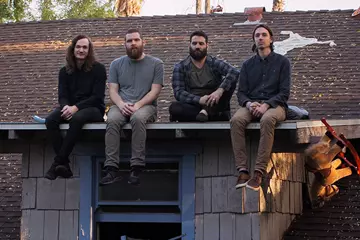 Austra
AustraIn the wake of the US election results, Katie Stelmanis is in New York, a city both shrouded in collective mourning and shot through with anger. The 31-year-old Canadian, who works and records under the name Austra, has been on the hop since the release of 2013's Olympia; spending stints living in Toronto, Montreal, Mexico City and, now, New York. "I'm addicted to moving around," she says. "I think I've always been pretty restless. But, for sure, touring has made me very addicted to travelling. I always have 'FOMO', as they say. I always wish I was in a different city, and have fantasies of moving to another city."
Stelmanis says "for now" she's in New York; "a liberal sanctuary" in a country that, suddenly, seems "quite terrifying". She's soon to be on the road, though, for much of 2017, touring behind the third Austra LP. It's called, coincidentally enough, Future Politics; its loaded title seeming evermore loaded in the current American political climate.
"It definitely has nothing to do with the presidential election or Donald Trump, by any means," Stelmanis explains. "I originally started writing the record whilst reading about the environment, and feeling this deep sadness about the destruction of the environment. They were these deeply emotional songs, filled with the trauma of that destruction. Then I started connecting the destruction of the environment to the rise of capitalism. It was so dark. Eventually, I was able to feel more optimistic by reading all these texts, from economists to straight-up sci-fi, about the future, and how boundless the future is. That concept made me feel, suddenly, optimistic. Now, I feel like the best thing you can do is plan for the future, even in the face of what has just happened with this election."
"I originally started writing the record whilst reading about the environment, and feeling this deep sadness about the destruction of the environment."
Future Politics mirrors that sense of motion in its lyrics, moving from pessimism to optimism. "I am moribund/It's what's you want: torpidity," Stelmanis sings, on opener We Were Alive, "Doctor, what's the cure for apathy?" By the second song, the LP's title track, she's found the answer for her blues: "There's only one way: Future Politics!" — which leads to Side B moments like Freepower, where she celebrates liberated thinking, and our ability to "delete" traditions that are now outmoded, harmful.
Don't miss a beat with our FREE daily newsletter
"You can tell which songs were written in the darker period, which ones in the more optimistic period," offers Stelmanis. "People write love-songs about breaking up with humans all the time, to me I see what I was doing as writing heartbroken songs about bigger issues. The Great Barrier Reef may not exist in 20 years. There's a real deep, personal sadness that I feel, and that a lot of people feel; a collective sadness.
"I think our generation, in general, is feeling a very deep sense of hopelessness; that no one really knows what to do, how to tackle these problems that are in front of us. And that our governments are completely incapable of tackling these problems for us. I personally don't feel like any of the issues that are important to me were even considered in the US election; they were never discussed, never mind something that people could actually vote on. We need to create a climate where issues like climate change are discussed, are prioritised. We need to discuss these ideas, and imagine futures; thinking about what we want the future to look like. As artists — as this international generation — we need to communicate these ideas. And there's the potential for these ideas, for our ideas, to filter into the mainstream, into the political discourse."
In contrast to the grand themes that she was kicking around, Stelmanis' musical ideas for Future Politics were a little more subdued. "It sounds like a really low goal, but having a record that sounded really good in a coffee shop, that was what I wanted to do," she laughs. "I had this idea that I wanted to make really chill background music. People can think of Austra songs as being quite abrasive, because I always sing with this really loud, full voice. So, this time, I experimented with a lot of different types of singing: more of a head voice than a chest voice, more whispery singing, softer singing. I made the decision to record my own vocals, so I didn't have to stress about being in the studio, and wasting lots of money. With Olympia, I definitely felt the stress of time, and I feel that had a negative effect on the album. This time was definitely more casual. But, ultimately… the songs changed as I went along. You have that realisation that you can't expect to be a touring band, playing festivals, [while] making background music. So, I tried to make some stuff that was a bit more upbeat."
"To me I see what I was doing as writing heartbroken songs about bigger issues. The Great Barrier Reef may not exist in 20 years."
This musical upbeatness — first single Utopia and the title track are total bangers — means that the LP's thematic sentiments are smuggled into pop songs. There's less of the dancefloor/early house influence that played on Olympia, but it's still a sugared pill. Future Politics is sweet to listen to, yet there's no doubting it's an explicitly political record, in the old fashioned sense: it's not about identity politics, but about collective political action. And, Stelmanis wants to reassert, it's a political record that she hopes carries as much positivity as anything else; there is anger on the record, but just as much optimism.
"In the political realm, we've been this culture of resistance for a long time; our political energies, our voices, our votes used to fight against these terrible policies. But I don't think there's been much energy spent on imagining new ones," Stelmanis says. "What's just happened in the United States, you have the fall of neo-liberalism but there was no option on the left to replace that. But the right had an option right there: they'd been building up this neo-fascism for years and they found the perfect candidate for it. I think there needs to be an entirely new, reimagined way of living that needs to be conceptualised, and that those ideas need to be discussed."
Discussion, for Stelmanis, starts with interviews. She's always been open in conversations — speaking about her queer identity and the social importance of doing so — but, talking about Future Politics, there's a sense of undeniable, palpable joy. "It's fun for me to do these interviews!" she beams. "I've got a lot things I want to talk about. I feel like for the last three years I've been absorbing so much information, and now I get to talk about and participate in this conversation that's really important.
"I don't want people to lose hope, or feel hopeless. That's something that's happening right now; people are lost, and it's a very scary time. For our generation, it's really the first experience of genuine political uncertainty we've felt, at home. I want people to be transfixed on the future, on what they want the future to look like. And then, their next goal has to be how to get there. If you're feeling hopeless, and it's difficult to imagine that, we need to find ways to motivate people to want to think about these things."















